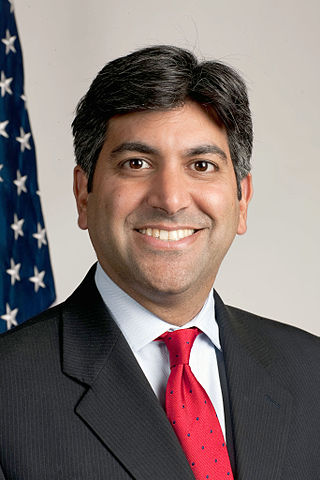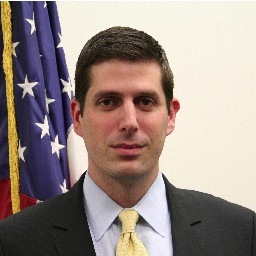
The White House Fellows program is a non-partisan fellowship established via Executive Order 11183 by President Lyndon B. Johnson in October 1964. The fellowship is one of USA's most prestigious programs for leadership and public service, offering exceptional US Citizens first-hand experience working at the highest levels of the federal government. The fellowship was founded based upon a suggestion from John W. Gardner, then the president of Carnegie Corporation and later the sixth secretary of health, education, and welfare.

The Georgetown University Law Center is the law school of Georgetown University, a private research university in Washington, D.C., United States. It was established in 1870 and is the largest law school in the United States by enrollment, with over 2,000 students. It frequently receives the most full-time applications of any law school in the United States. Georgetown is considered part of the T14, an unofficial designation in the legal community of the best 14 law schools in the United States.
Bottega University is a for-profit, accredited distance learning university headquartered in Salt Lake City, Utah, United States.

The McCourt School of Public Policy is one of eleven constituent schools of Georgetown University in Washington, D.C. The McCourt School offers master's degrees in public policy, international development policy, policy management, data science for public policy, and policy leadership as well as administers several professional certificate programs and houses fifteen affiliated research centers. The McCourt School has twenty-one full-time faculty members, ten visiting faculty members, more than one-hundred adjunct faculty members and approximately 450 enrolled students across the various degree and executive education programs.
Specialized domestic violence courts are designed to improve victim safety and enhance defendant accountability. There is no one set definition of a specialized violence court, although these types of courts can be either civil or criminal and typically hear the majority of an area's domestic violence cases on a separate calendar. Additionally, these courts are typically led by specially assigned judges who can make more informed and consistent decisions based on their expertise and experience with the unique legal and personal issues in domestic violence cases.

Aneesh Paul Chopra is an American executive who served as the first Chief Technology Officer of the United States. He was appointed in 2009 by President Barack Obama and was at the White House through 2012. Chopra previously served as Virginia's Secretary of Technology under Governor Tim Kaine. Chopra was a candidate in 2013 for the Democratic nomination for Lieutenant Governor of Virginia. He is the author of Innovative State: How New Technologies Can Transform Government (2014) and co-founder and president of CareJourney. In 2015 he joined Albright Stonebridge Group as a senior advisor.
The United States Chief Technology Officer is an official in the Office of Science and Technology Policy. The U.S. CTO helps the President and their team harness the power of technology and data to benefit all Americans. The CTO works closely with others both across and outside government on a broad range of work including bringing technology expertise to bear on federal policy and programs, and promoting values-driven technological innovation. The CTO and their team have historically focused on leveraging technology and technical expertise to help create jobs, strengthen privacy protections, harness the benefits and mitigate the risks of artificial intelligence, create paths to improve government services with lower costs, higher quality and increased transparency and accessibility, help upgrade agencies to use open data and expand their data science capabilities, improve quality and reduce the costs of health care and criminal justice, increase access to broadband, bring technical talent into government for policy and modern operations input, improve community innovation engagement by agencies working on local challenges, and help keep the nation secure.

The South Carolina Circuit Court is the state court of general jurisdiction of the U.S. state of South Carolina. It consists of a civil division and a criminal division.

Code for America is a 501(c)(3) civic tech non-profit organization that was founded by Jennifer Pahlka in 2009, "to promote ‘civic hacking’, and to bring 21st century technology to government." Federal, state, and local governments often lack the budget, expertise, and resources to efficiently deploy modern software. Code for America partners with governments to help deliver software services, particularly to low income communities and to people who have been left out. "A large population of American citizens in poverty are not connected and exposed to government resources that they are eligible for—nearly US$60,000,000,000 worth of potential benefits for people in need remain unclaimed every year." Projects that illustrate the organization's impact include:

Megan J. Smith is an American engineer and technologist. She was the third Chief Technology Officer of the United States and Assistant to the President, serving under President Barack Obama. She was previously a vice president at Google, leading new business development and early-stage partnerships across Google's global engineering and product teams at Google for nine years, was general manager of Google.org, a vice president briefly at Google[x] where she co-created WomenTechmakers, is the former CEO of Planet Out and worked as an engineer on early smartphones at General Magic. She serves on the boards of MIT and Vital Voices, was a member of the USAID Advisory Committee on Voluntary Aid and co-founded the Malala Fund. Today Smith is the CEO and Founder of shift7. On September 4, 2014, she was named as the third U.S. CTO, succeeding Todd Park, and serving until January, 2017.

The Presidential Innovation Fellows program is a competitive fellowship program that pairs top innovators from the private sector, non-profits, and academia with top innovators in government to collaborate on solutions that aim to deliver significant results in months, not years. It was established in 2012 and has operated continuously since then. The program focuses on generating measurable results, using innovation techniques from private industry such as Lean Startup, Design Thinking, and Agile Development. It is a service of GSA's Technology Transformation Services department.

Nick Sinai is a venture capitalist, adjunct faculty at Harvard Kennedy School, author, and a former senior official in the Obama Administration.
Reuters Digital Vision Program (RDVP) was an academic program.
Access to justice is a basic principle in rule of law which describes how citizens should have equal access to the justice system and/or other justice services so that they can effectively resolve their justice problems. Without access to justice, people are not able to fully exercise their rights, challenge discrimination, or hold decision-makers accountable for their actions.
Andela is a private marketplace for technical talent. Andela focuses on sustainable careers, connecting technologists with long-term engagements, access to international roles, and competitive compensation.
The Brooke Owens Fellowship is a non-profit program in the United States that provides paid internships and executive mentorship for undergraduate women seeking a career in aviation or space exploration. The fellowship was created to honor the memory of Brooke Owens, a pilot and space policy expert who died of cancer at the age of 35.

Corinna "Cori" Zarek is an American lawyer, public interest technologist and adjunct professor of media law.
Andrea M. Matwyshyn is an American law professor and engineering professor at The Pennsylvania State University. She is known as a scholar of technology policy, particularly as an expert at the intersection of law and computer security and for her work with government. She is credited with originating the legal and policy concept of the Internet of Bodies.
Public interest technology is an approach to the use of technology to promote "the development and realization of socially responsible solutions to the challenges in a technology-driven world." It has been characterized as "people-centered problem solving." PIT emerged as a field of academic research and action in higher education in 2019 with the establishment of the Public Interest Technology University Network (PIT-UN) by New America.
Albert William Sheppard Jr. was an American judge in the Court of Common Pleas of Philadelphia, in Pennsylvania’s First Judicial District. He played significant roles in reducing that court’s case backlog, and in establishing its business court, the Commerce Case Management Program, on which he served for its first 11 years.









